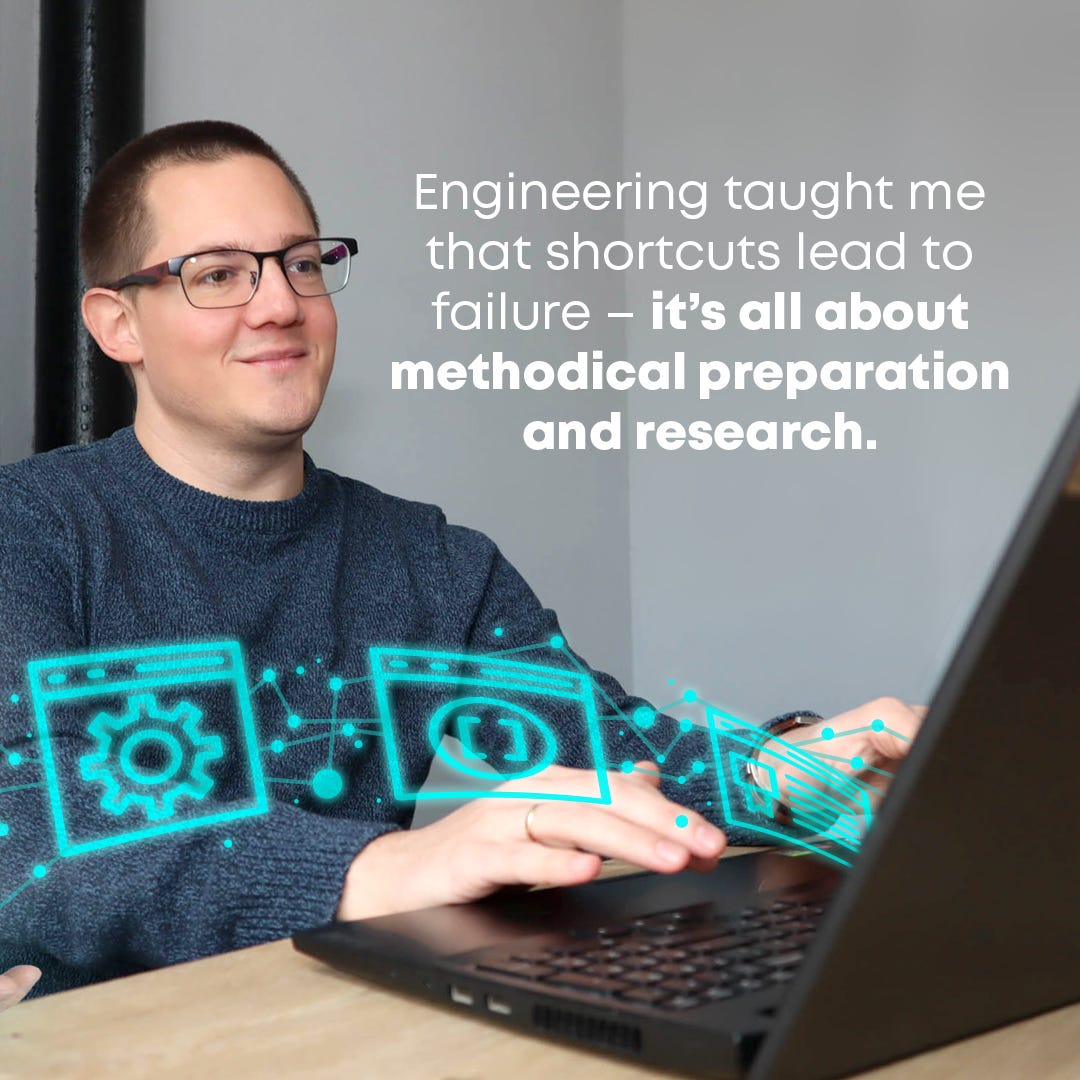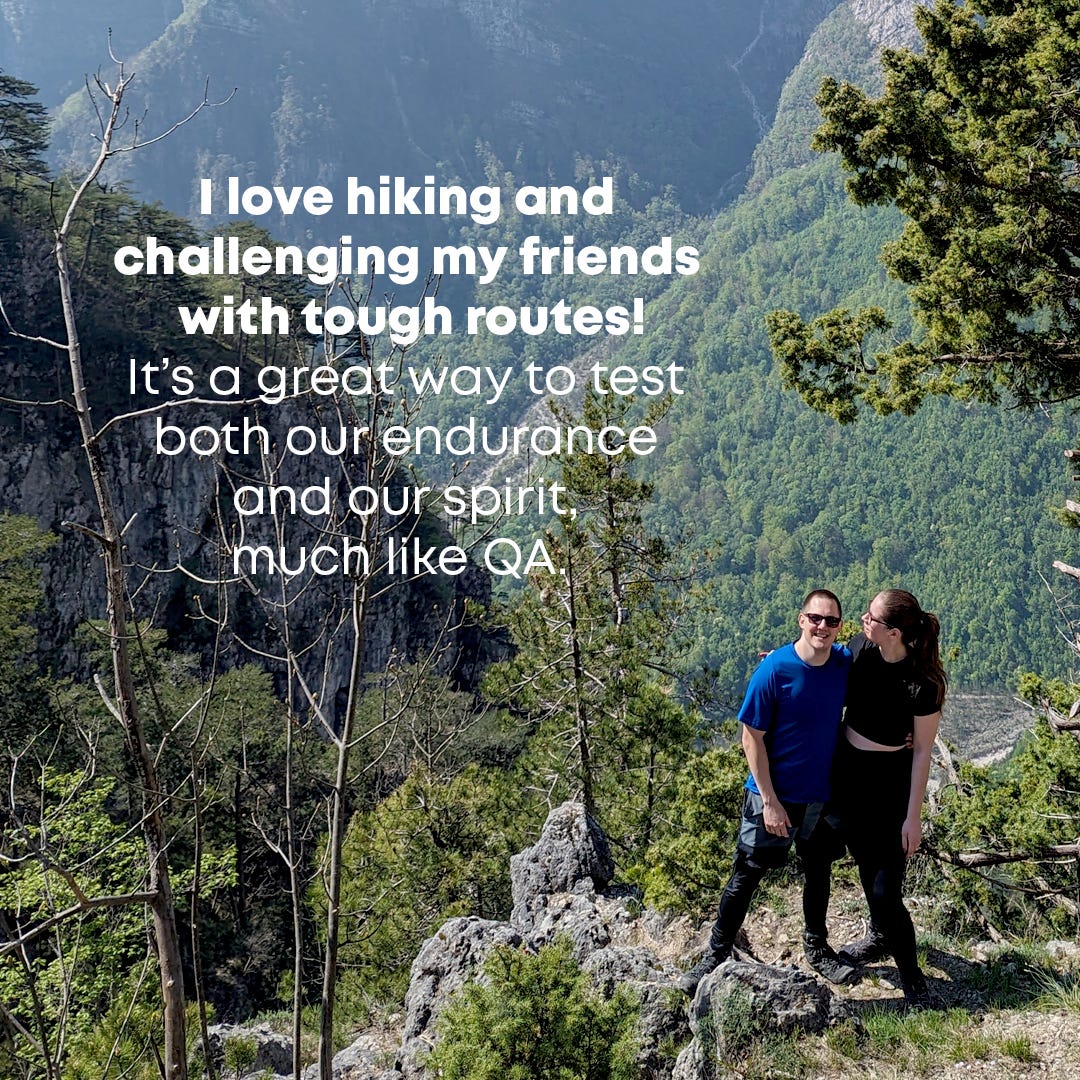
Meet our talented QA Engineer who has seamlessly transitioned from Electrical Design to ensuring the highest quality standards in our projects. In this interview, he shares his journey, the valuable skills he brings from his engineering background, and his QA commitment to excellence at Walter Code. Read on to find out how his experience in Electrical Design shapes his approach to quality assurance and drives his passion for continuous improvement.
1.Could you tell us about your journey to become a QA Engineer at Walter Code? What initially raised your interest in this field?
I remember a conversation with a colleague at my previous job, where she mentioned that QA engineers are sought after and how I should investigate that field. Almost a year later, I had completely forgotten about it and was looking for a job as an Electrical Designer when I was contacted by Walter Code for a job opening as a QA. I thought it was a funny coincidence, and while preparing for the interview I was intrigued by meticulous approaches QA can apply during testing.
2. In what ways does your Electrical engineering background enhance your approach to quality assurance? Are there specific skills or principles you find useful?
Engineering studies have taught me that taking shortcuts in preparation is just a quick way to failure. As an Electrical Designer, I’ve always tried to be methodical and prepare for every new project. I think I apply the same approach in my current job. There are still many things I don’t know but I enjoy doing research. Whether it’s for a new feature or investigating how a defect occurred.

3. Can you describe the current project you’re working on and how your expertise adds value to it?
We’re developing add-ins for Revit, where my team focuses on improving workflows for MEP engineers. Currently, we have four products: HVAC, Electrical, MEP, and Fabrication. I first started as a QA for Electrical, and my previous job helped me understand the tools and brought me closer to a user’s way of thinking. I also had previous interactions with Mechanical engineers. That helped me understand what my teammate Admir, an experienced QA with over 10 years of expertise, is trying to convey.

4. What are the key metrics or goals you use to measure the success of your QA process?
My main goal during testing is to prevent a serious bug from reaching the user, and collaborating on how a certain functionality can be beneficial to them. Having accurate estimates on the duration of tickets can influence how much work a team can take during one Sprint. Writing meaningful test cases where a large percentage of functionality is covered can make us more confident in finding any future defects.
5. Collaboration can be crucial in QA. How do you handle situations where you and developers or product owners might have differing views on quality or functionality?
Product we’re working on, Naviate, already has some well-established quality standards, which is very helpful. We work with technical people from differing engineering backgrounds, so it’s crucial to have everyone on the team heard and to trust the Product Owner’s decisions. Our MEP and Fabrication products are focused on customers from the US market, so we lean on our Product Owner’s experience with that market and the users’ habits. If there are still any dilemmas left, we consult Product Specialists and even gauge how much a particular tool is used, but ultimately it is the Product Owner’s decision.
6. How has agile methodology impacted your work? Could you give an example of how it’s helped streamline processes or improve product quality?
In my previous position, I can say I worked in a waterfall type of project development. I depended on different colleagues to finish their phases first.
Now as a QA, although I still depend on developers to complete their work first, I find that we gather feedback and make decisions much faster. In return makes us more in control of our product development. During our last PI planning, the team had to make some decisions in real time, causing the team to have to land on its feet immediately, but in turn resulted in some fruitful negotiations with potential clients.
7. What do you enjoy doing outside of work? Do any of your hobbies or interests connect back to your skills in QA?
I always enjoyed going to the mountains, long time ago I was an avid skier. Nowadays I enjoy hikes with my wife and friends, testing their spirit with challenging routes. I’m a fan of standup comedy, I like relaxing on a couch watching a good show. I would like to cross as many places as possible from my travel list before I leave, something which Walter helps me with. I’d like to return to reading specialized engineering literature, which can always be helpful in thinking as a QA for Electrical.

8. What excites you the most about working at Walter Code, and what do you look forward to achieving here?
It’s great that this work has provided me with constant opportunities to improve my knowledge. Modeling in Revit and learning new tools, soft skills as a Scrum Master, or QA competency in the form of testing automation, all provided to improve my knowledge. Every new task in these roles can ask of you to investigate and serve as a learning experience. I look forward to deepening my knowledge in testing automation. As long as I’m constantly improving, I’m content.
At Walter Code, we value growth and development. It’s inspiring to see how our team members, like our QA Engineer, are always striving for excellence. Whether it’s improving product quality or mastering new skills in testing automation, we’re proud to support our employees. Stay tuned for more behind-the-scenes insights from our amazing team.